Psychology: Theories of Personality - Humanistic vs Psychodynamic
VerifiedAdded on 2023/03/17
|6
|1486
|57
Essay
AI Summary
This essay delves into the humanistic and psychodynamic theories of personality, contrasting the perspectives of Carl Rogers and Sigmund Freud. The essay explores Rogers' emphasis on self-actualization and the development of the self-concept, contrasting this with Freud's psychodynamic approach, which focuses on unconscious forces, childhood experiences, and the interplay of the id, ego, and superego. The essay examines the core tenets of each theory, including the role of past experiences in shaping personality. It also discusses how personality is measured within each framework and analyzes the strengths and weaknesses of both theories. The essay concludes by providing a comprehensive overview of each theory's contributions to the field of psychology and their relevance in understanding human behavior.
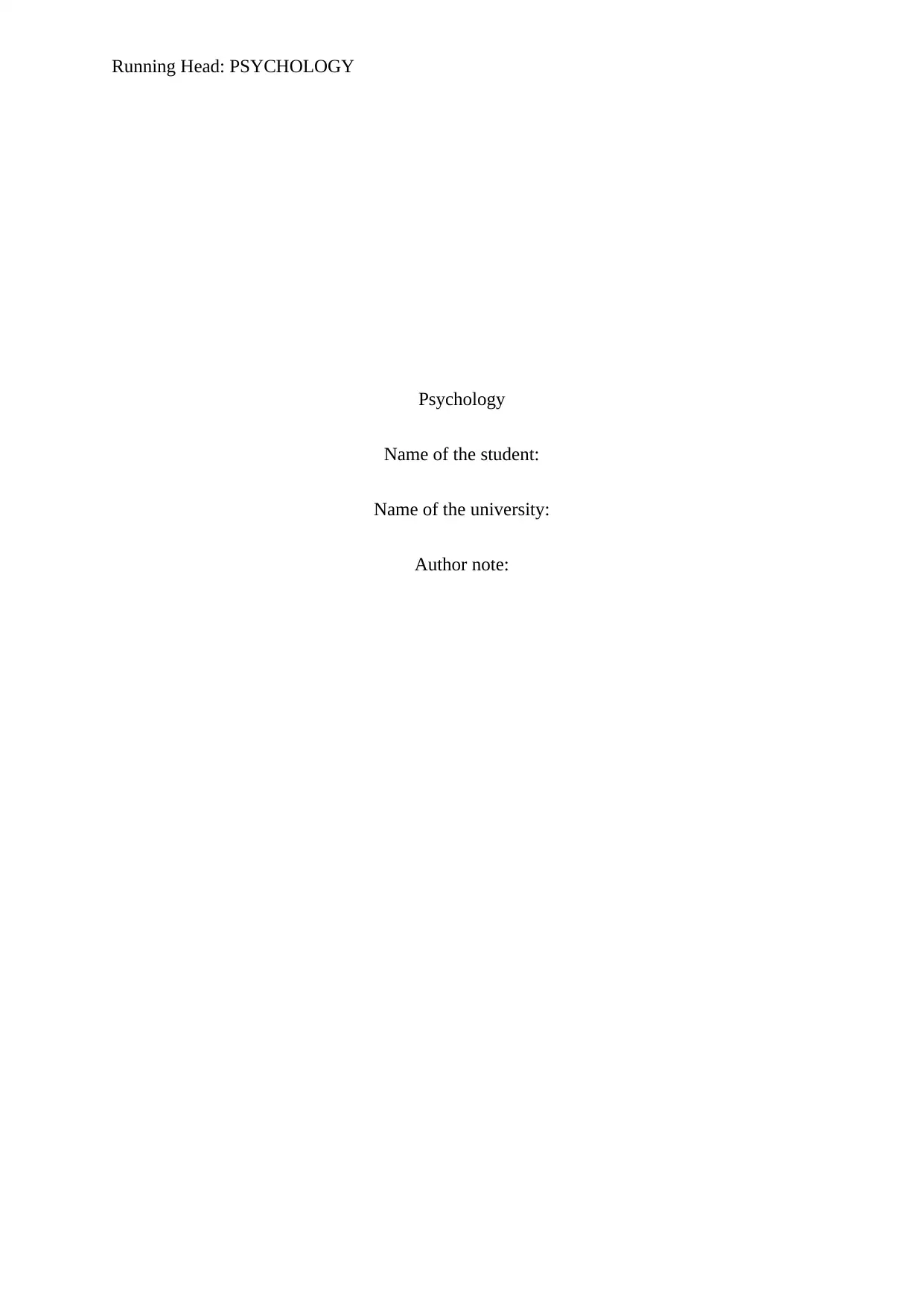
Running Head: PSYCHOLOGY
Psychology
Name of the student:
Name of the university:
Author note:
Psychology
Name of the student:
Name of the university:
Author note:
Paraphrase This Document
Need a fresh take? Get an instant paraphrase of this document with our AI Paraphraser
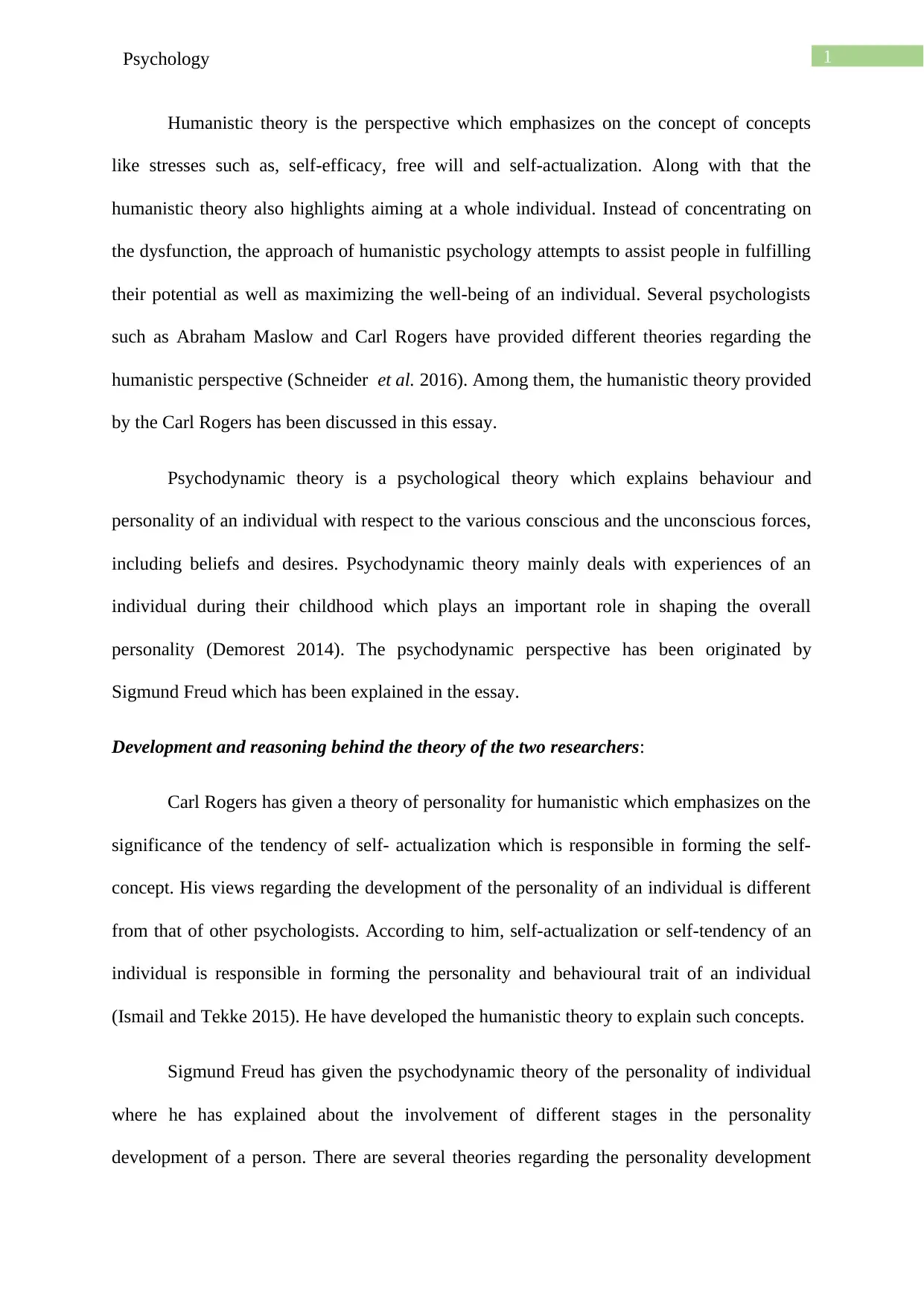
1Psychology
Humanistic theory is the perspective which emphasizes on the concept of concepts
like stresses such as, self-efficacy, free will and self-actualization. Along with that the
humanistic theory also highlights aiming at a whole individual. Instead of concentrating on
the dysfunction, the approach of humanistic psychology attempts to assist people in fulfilling
their potential as well as maximizing the well-being of an individual. Several psychologists
such as Abraham Maslow and Carl Rogers have provided different theories regarding the
humanistic perspective (Schneider et al. 2016). Among them, the humanistic theory provided
by the Carl Rogers has been discussed in this essay.
Psychodynamic theory is a psychological theory which explains behaviour and
personality of an individual with respect to the various conscious and the unconscious forces,
including beliefs and desires. Psychodynamic theory mainly deals with experiences of an
individual during their childhood which plays an important role in shaping the overall
personality (Demorest 2014). The psychodynamic perspective has been originated by
Sigmund Freud which has been explained in the essay.
Development and reasoning behind the theory of the two researchers:
Carl Rogers has given a theory of personality for humanistic which emphasizes on the
significance of the tendency of self- actualization which is responsible in forming the self-
concept. His views regarding the development of the personality of an individual is different
from that of other psychologists. According to him, self-actualization or self-tendency of an
individual is responsible in forming the personality and behavioural trait of an individual
(Ismail and Tekke 2015). He have developed the humanistic theory to explain such concepts.
Sigmund Freud has given the psychodynamic theory of the personality of individual
where he has explained about the involvement of different stages in the personality
development of a person. There are several theories regarding the personality development
Humanistic theory is the perspective which emphasizes on the concept of concepts
like stresses such as, self-efficacy, free will and self-actualization. Along with that the
humanistic theory also highlights aiming at a whole individual. Instead of concentrating on
the dysfunction, the approach of humanistic psychology attempts to assist people in fulfilling
their potential as well as maximizing the well-being of an individual. Several psychologists
such as Abraham Maslow and Carl Rogers have provided different theories regarding the
humanistic perspective (Schneider et al. 2016). Among them, the humanistic theory provided
by the Carl Rogers has been discussed in this essay.
Psychodynamic theory is a psychological theory which explains behaviour and
personality of an individual with respect to the various conscious and the unconscious forces,
including beliefs and desires. Psychodynamic theory mainly deals with experiences of an
individual during their childhood which plays an important role in shaping the overall
personality (Demorest 2014). The psychodynamic perspective has been originated by
Sigmund Freud which has been explained in the essay.
Development and reasoning behind the theory of the two researchers:
Carl Rogers has given a theory of personality for humanistic which emphasizes on the
significance of the tendency of self- actualization which is responsible in forming the self-
concept. His views regarding the development of the personality of an individual is different
from that of other psychologists. According to him, self-actualization or self-tendency of an
individual is responsible in forming the personality and behavioural trait of an individual
(Ismail and Tekke 2015). He have developed the humanistic theory to explain such concepts.
Sigmund Freud has given the psychodynamic theory of the personality of individual
where he has explained about the involvement of different stages in the personality
development of a person. There are several theories regarding the personality development
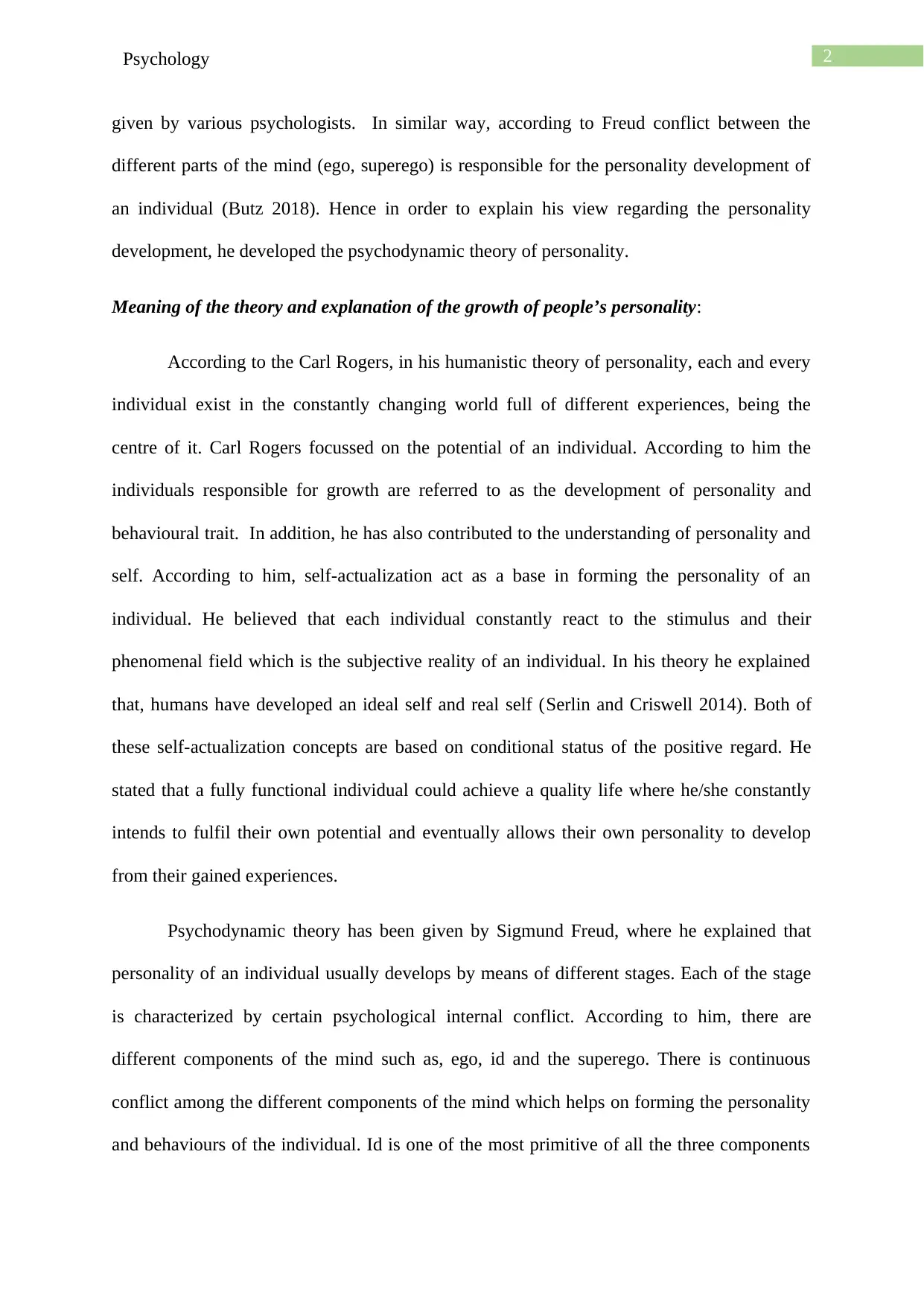
2Psychology
given by various psychologists. In similar way, according to Freud conflict between the
different parts of the mind (ego, superego) is responsible for the personality development of
an individual (Butz 2018). Hence in order to explain his view regarding the personality
development, he developed the psychodynamic theory of personality.
Meaning of the theory and explanation of the growth of people’s personality:
According to the Carl Rogers, in his humanistic theory of personality, each and every
individual exist in the constantly changing world full of different experiences, being the
centre of it. Carl Rogers focussed on the potential of an individual. According to him the
individuals responsible for growth are referred to as the development of personality and
behavioural trait. In addition, he has also contributed to the understanding of personality and
self. According to him, self-actualization act as a base in forming the personality of an
individual. He believed that each individual constantly react to the stimulus and their
phenomenal field which is the subjective reality of an individual. In his theory he explained
that, humans have developed an ideal self and real self (Serlin and Criswell 2014). Both of
these self-actualization concepts are based on conditional status of the positive regard. He
stated that a fully functional individual could achieve a quality life where he/she constantly
intends to fulfil their own potential and eventually allows their own personality to develop
from their gained experiences.
Psychodynamic theory has been given by Sigmund Freud, where he explained that
personality of an individual usually develops by means of different stages. Each of the stage
is characterized by certain psychological internal conflict. According to him, there are
different components of the mind such as, ego, id and the superego. There is continuous
conflict among the different components of the mind which helps on forming the personality
and behaviours of the individual. Id is one of the most primitive of all the three components
given by various psychologists. In similar way, according to Freud conflict between the
different parts of the mind (ego, superego) is responsible for the personality development of
an individual (Butz 2018). Hence in order to explain his view regarding the personality
development, he developed the psychodynamic theory of personality.
Meaning of the theory and explanation of the growth of people’s personality:
According to the Carl Rogers, in his humanistic theory of personality, each and every
individual exist in the constantly changing world full of different experiences, being the
centre of it. Carl Rogers focussed on the potential of an individual. According to him the
individuals responsible for growth are referred to as the development of personality and
behavioural trait. In addition, he has also contributed to the understanding of personality and
self. According to him, self-actualization act as a base in forming the personality of an
individual. He believed that each individual constantly react to the stimulus and their
phenomenal field which is the subjective reality of an individual. In his theory he explained
that, humans have developed an ideal self and real self (Serlin and Criswell 2014). Both of
these self-actualization concepts are based on conditional status of the positive regard. He
stated that a fully functional individual could achieve a quality life where he/she constantly
intends to fulfil their own potential and eventually allows their own personality to develop
from their gained experiences.
Psychodynamic theory has been given by Sigmund Freud, where he explained that
personality of an individual usually develops by means of different stages. Each of the stage
is characterized by certain psychological internal conflict. According to him, there are
different components of the mind such as, ego, id and the superego. There is continuous
conflict among the different components of the mind which helps on forming the personality
and behaviours of the individual. Id is one of the most primitive of all the three components
⊘ This is a preview!⊘
Do you want full access?
Subscribe today to unlock all pages.

Trusted by 1+ million students worldwide
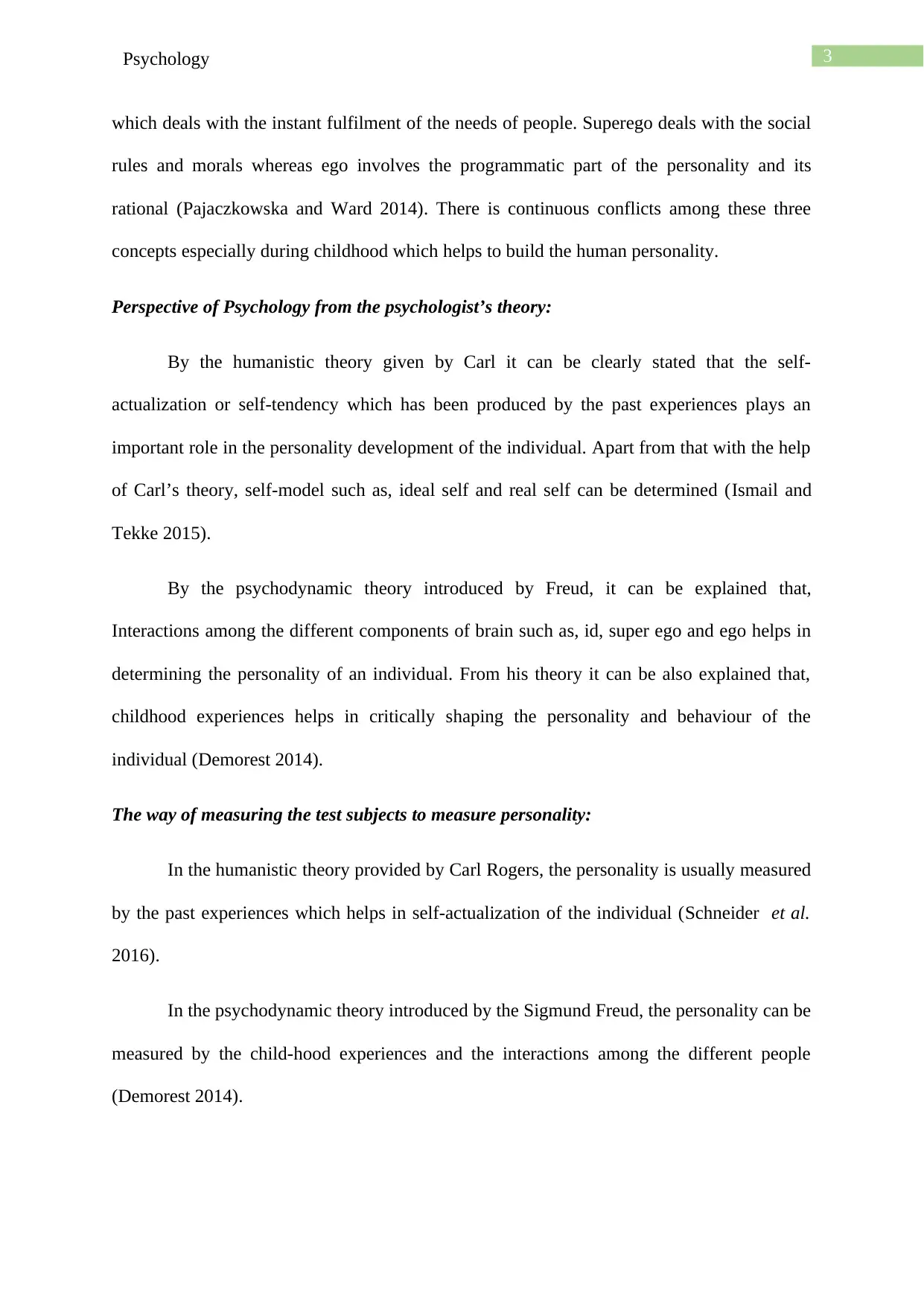
3Psychology
which deals with the instant fulfilment of the needs of people. Superego deals with the social
rules and morals whereas ego involves the programmatic part of the personality and its
rational (Pajaczkowska and Ward 2014). There is continuous conflicts among these three
concepts especially during childhood which helps to build the human personality.
Perspective of Psychology from the psychologist’s theory:
By the humanistic theory given by Carl it can be clearly stated that the self-
actualization or self-tendency which has been produced by the past experiences plays an
important role in the personality development of the individual. Apart from that with the help
of Carl’s theory, self-model such as, ideal self and real self can be determined (Ismail and
Tekke 2015).
By the psychodynamic theory introduced by Freud, it can be explained that,
Interactions among the different components of brain such as, id, super ego and ego helps in
determining the personality of an individual. From his theory it can be also explained that,
childhood experiences helps in critically shaping the personality and behaviour of the
individual (Demorest 2014).
The way of measuring the test subjects to measure personality:
In the humanistic theory provided by Carl Rogers, the personality is usually measured
by the past experiences which helps in self-actualization of the individual (Schneider et al.
2016).
In the psychodynamic theory introduced by the Sigmund Freud, the personality can be
measured by the child-hood experiences and the interactions among the different people
(Demorest 2014).
which deals with the instant fulfilment of the needs of people. Superego deals with the social
rules and morals whereas ego involves the programmatic part of the personality and its
rational (Pajaczkowska and Ward 2014). There is continuous conflicts among these three
concepts especially during childhood which helps to build the human personality.
Perspective of Psychology from the psychologist’s theory:
By the humanistic theory given by Carl it can be clearly stated that the self-
actualization or self-tendency which has been produced by the past experiences plays an
important role in the personality development of the individual. Apart from that with the help
of Carl’s theory, self-model such as, ideal self and real self can be determined (Ismail and
Tekke 2015).
By the psychodynamic theory introduced by Freud, it can be explained that,
Interactions among the different components of brain such as, id, super ego and ego helps in
determining the personality of an individual. From his theory it can be also explained that,
childhood experiences helps in critically shaping the personality and behaviour of the
individual (Demorest 2014).
The way of measuring the test subjects to measure personality:
In the humanistic theory provided by Carl Rogers, the personality is usually measured
by the past experiences which helps in self-actualization of the individual (Schneider et al.
2016).
In the psychodynamic theory introduced by the Sigmund Freud, the personality can be
measured by the child-hood experiences and the interactions among the different people
(Demorest 2014).
Paraphrase This Document
Need a fresh take? Get an instant paraphrase of this document with our AI Paraphraser
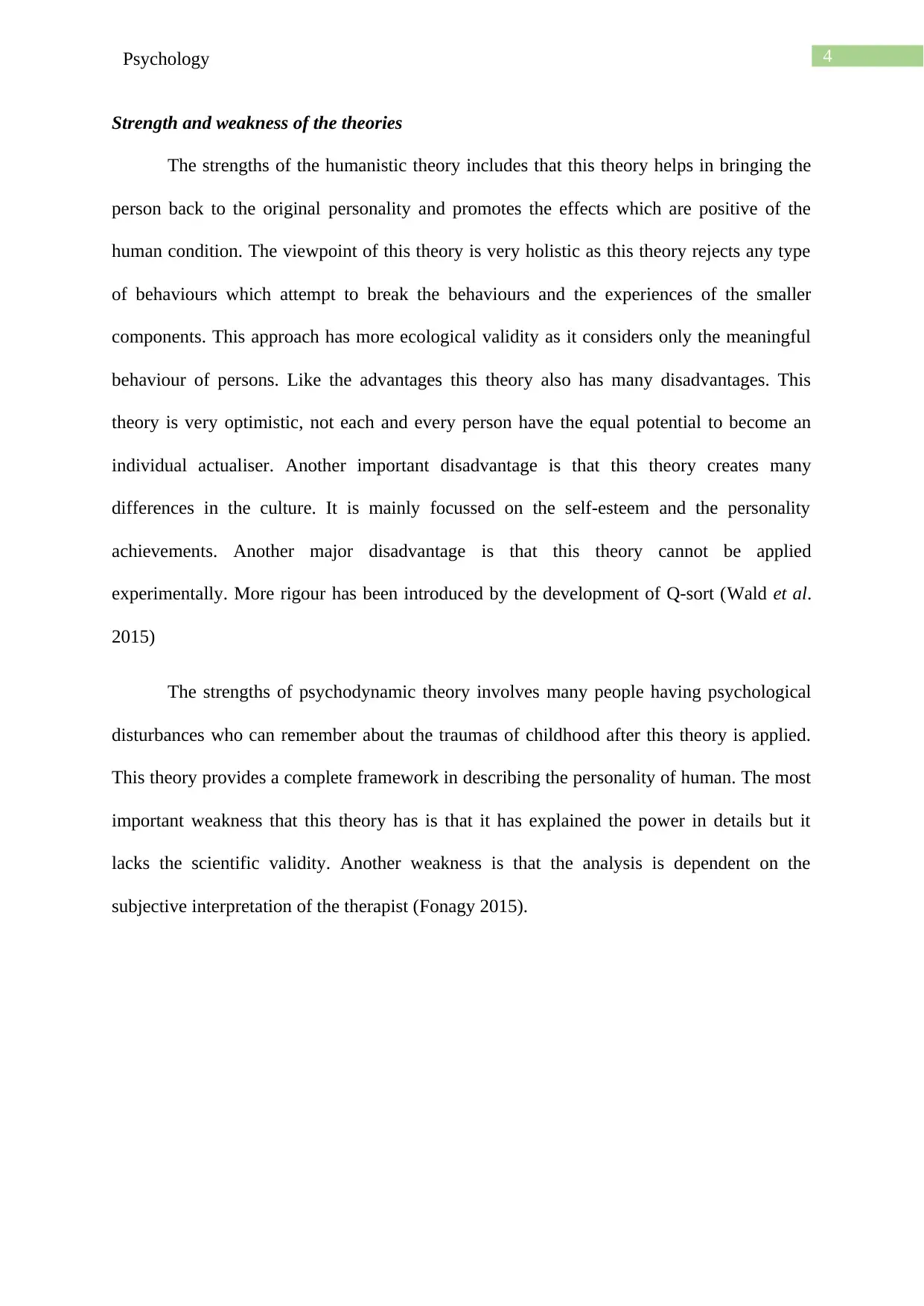
4Psychology
Strength and weakness of the theories
The strengths of the humanistic theory includes that this theory helps in bringing the
person back to the original personality and promotes the effects which are positive of the
human condition. The viewpoint of this theory is very holistic as this theory rejects any type
of behaviours which attempt to break the behaviours and the experiences of the smaller
components. This approach has more ecological validity as it considers only the meaningful
behaviour of persons. Like the advantages this theory also has many disadvantages. This
theory is very optimistic, not each and every person have the equal potential to become an
individual actualiser. Another important disadvantage is that this theory creates many
differences in the culture. It is mainly focussed on the self-esteem and the personality
achievements. Another major disadvantage is that this theory cannot be applied
experimentally. More rigour has been introduced by the development of Q-sort (Wald et al.
2015)
The strengths of psychodynamic theory involves many people having psychological
disturbances who can remember about the traumas of childhood after this theory is applied.
This theory provides a complete framework in describing the personality of human. The most
important weakness that this theory has is that it has explained the power in details but it
lacks the scientific validity. Another weakness is that the analysis is dependent on the
subjective interpretation of the therapist (Fonagy 2015).
Strength and weakness of the theories
The strengths of the humanistic theory includes that this theory helps in bringing the
person back to the original personality and promotes the effects which are positive of the
human condition. The viewpoint of this theory is very holistic as this theory rejects any type
of behaviours which attempt to break the behaviours and the experiences of the smaller
components. This approach has more ecological validity as it considers only the meaningful
behaviour of persons. Like the advantages this theory also has many disadvantages. This
theory is very optimistic, not each and every person have the equal potential to become an
individual actualiser. Another important disadvantage is that this theory creates many
differences in the culture. It is mainly focussed on the self-esteem and the personality
achievements. Another major disadvantage is that this theory cannot be applied
experimentally. More rigour has been introduced by the development of Q-sort (Wald et al.
2015)
The strengths of psychodynamic theory involves many people having psychological
disturbances who can remember about the traumas of childhood after this theory is applied.
This theory provides a complete framework in describing the personality of human. The most
important weakness that this theory has is that it has explained the power in details but it
lacks the scientific validity. Another weakness is that the analysis is dependent on the
subjective interpretation of the therapist (Fonagy 2015).
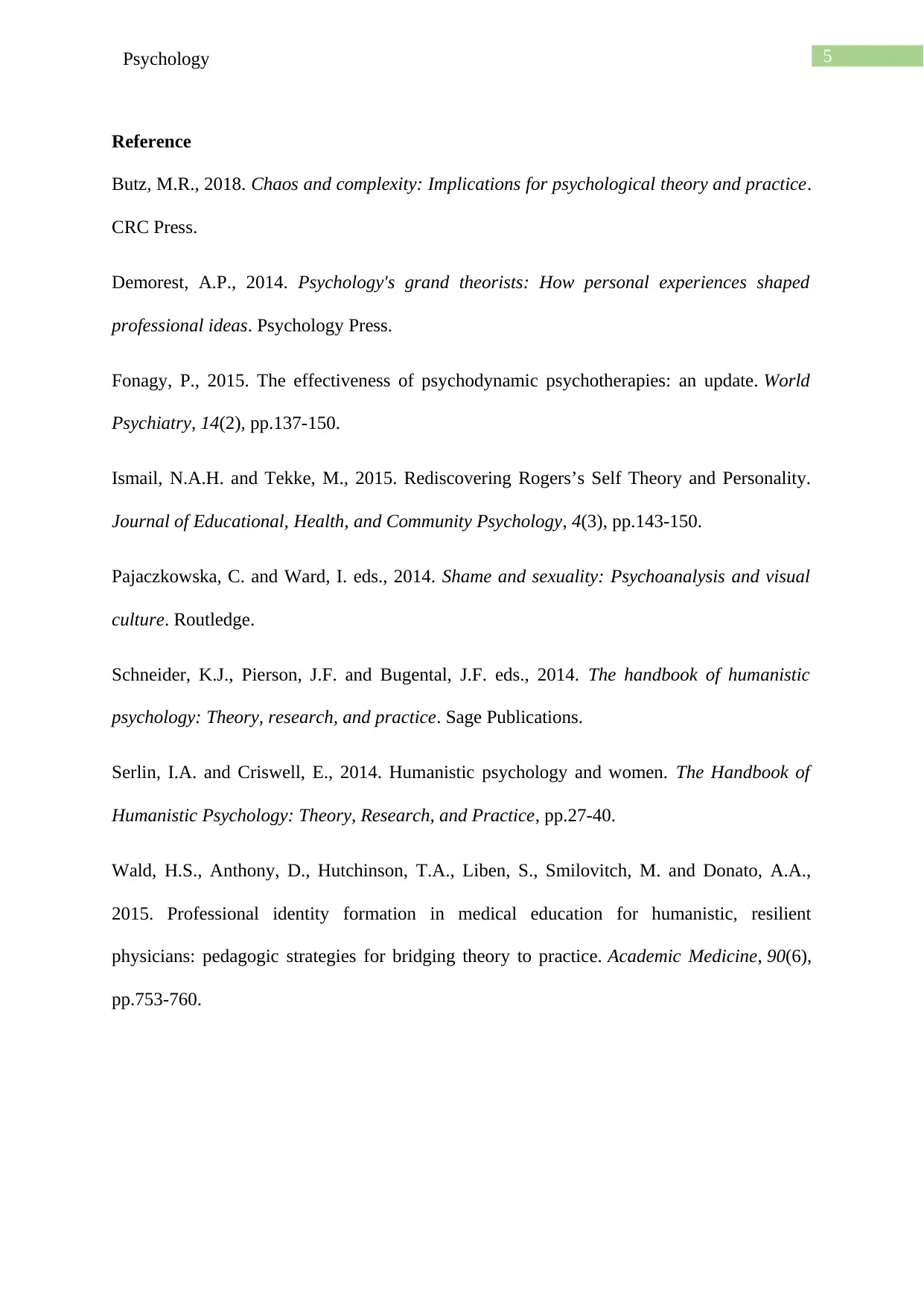
5Psychology
Reference
Butz, M.R., 2018. Chaos and complexity: Implications for psychological theory and practice.
CRC Press.
Demorest, A.P., 2014. Psychology's grand theorists: How personal experiences shaped
professional ideas. Psychology Press.
Fonagy, P., 2015. The effectiveness of psychodynamic psychotherapies: an update. World
Psychiatry, 14(2), pp.137-150.
Ismail, N.A.H. and Tekke, M., 2015. Rediscovering Rogers’s Self Theory and Personality.
Journal of Educational, Health, and Community Psychology, 4(3), pp.143-150.
Pajaczkowska, C. and Ward, I. eds., 2014. Shame and sexuality: Psychoanalysis and visual
culture. Routledge.
Schneider, K.J., Pierson, J.F. and Bugental, J.F. eds., 2014. The handbook of humanistic
psychology: Theory, research, and practice. Sage Publications.
Serlin, I.A. and Criswell, E., 2014. Humanistic psychology and women. The Handbook of
Humanistic Psychology: Theory, Research, and Practice, pp.27-40.
Wald, H.S., Anthony, D., Hutchinson, T.A., Liben, S., Smilovitch, M. and Donato, A.A.,
2015. Professional identity formation in medical education for humanistic, resilient
physicians: pedagogic strategies for bridging theory to practice. Academic Medicine, 90(6),
pp.753-760.
Reference
Butz, M.R., 2018. Chaos and complexity: Implications for psychological theory and practice.
CRC Press.
Demorest, A.P., 2014. Psychology's grand theorists: How personal experiences shaped
professional ideas. Psychology Press.
Fonagy, P., 2015. The effectiveness of psychodynamic psychotherapies: an update. World
Psychiatry, 14(2), pp.137-150.
Ismail, N.A.H. and Tekke, M., 2015. Rediscovering Rogers’s Self Theory and Personality.
Journal of Educational, Health, and Community Psychology, 4(3), pp.143-150.
Pajaczkowska, C. and Ward, I. eds., 2014. Shame and sexuality: Psychoanalysis and visual
culture. Routledge.
Schneider, K.J., Pierson, J.F. and Bugental, J.F. eds., 2014. The handbook of humanistic
psychology: Theory, research, and practice. Sage Publications.
Serlin, I.A. and Criswell, E., 2014. Humanistic psychology and women. The Handbook of
Humanistic Psychology: Theory, Research, and Practice, pp.27-40.
Wald, H.S., Anthony, D., Hutchinson, T.A., Liben, S., Smilovitch, M. and Donato, A.A.,
2015. Professional identity formation in medical education for humanistic, resilient
physicians: pedagogic strategies for bridging theory to practice. Academic Medicine, 90(6),
pp.753-760.
⊘ This is a preview!⊘
Do you want full access?
Subscribe today to unlock all pages.

Trusted by 1+ million students worldwide
1 out of 6
Related Documents
Your All-in-One AI-Powered Toolkit for Academic Success.
+13062052269
info@desklib.com
Available 24*7 on WhatsApp / Email
![[object Object]](/_next/static/media/star-bottom.7253800d.svg)
Unlock your academic potential
Copyright © 2020–2026 A2Z Services. All Rights Reserved. Developed and managed by ZUCOL.





